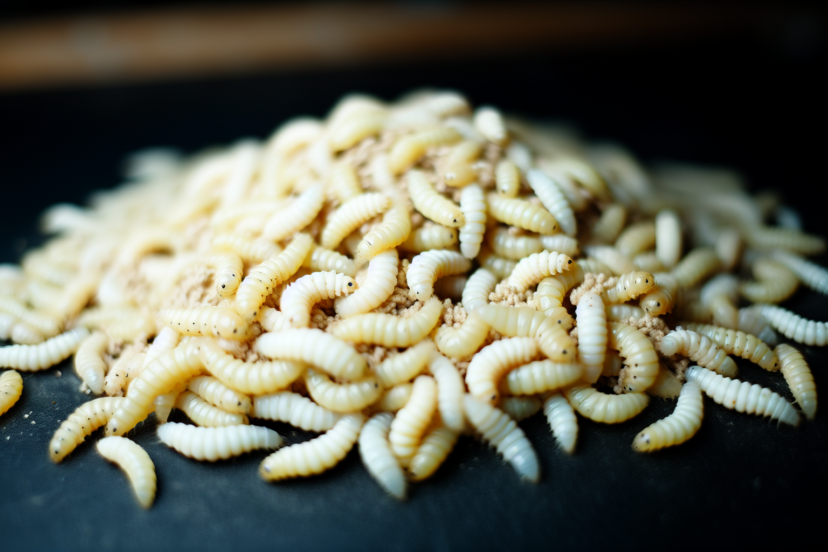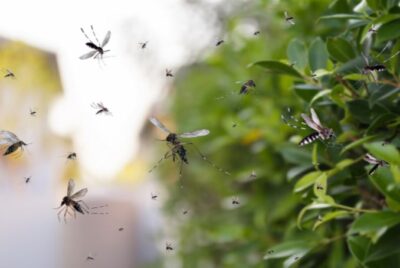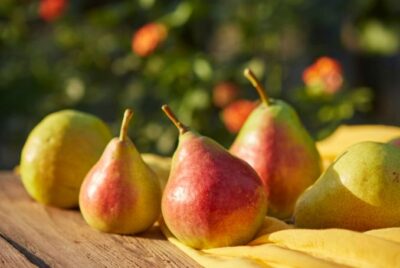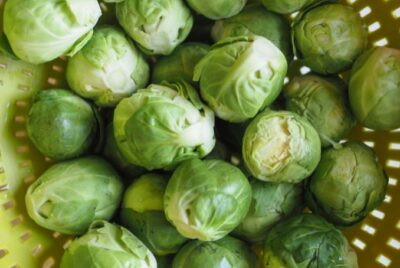Can Chickens Eat Maggots? The Truth About This Protein-Rich Snack
Are you a chicken owner looking for alternative sources of protein to supplement your flock’s diet? Do you find yourself wondering about the nutritional benefits and risks of feeding maggots to your chickens? With so much conflicting information available, it can be challenging to determine whether maggots are a safe and beneficial snack for your feathered friends.
So we’re here to uncover the truth about this protein-rich snack. In this article, we’ll explore the potential benefits and considerations of feeding maggots to chickens, helping you make an informed decision about whether to incorporate them into your flock’s diet.
Can Chickens Safely Eat Maggots?
Chickens can indeed safely eat maggots, and this can actually be beneficial for them. Maggots are high in protein, making them an excellent dietary supplement, especially for growing chickens, those laying eggs, or during molting periods.
Additionally, consuming maggots can be a natural foraging activity for chickens, stimulating their natural behaviors and providing enrichment. However, it’s important to source maggots from a safe environment, free from pesticides or other harmful chemicals, to ensure the health and safety of the chickens.
This means that while chickens can benefit from eating maggots, care should be taken regarding the source of the maggots to avoid introducing toxins into their diet.
The Nutritional Value of Maggots for Chickens
Maggots, as a part of poultry feed, can immensely benefit your chickens due to their high nutritional value. These tiny creatures are a veritable feast of protein, a nutrient that’s crucial for growth and overall well-being in chickens. Particularly, black soldier fly larvae, a common type of maggot, consist of about 50% protein, making them an excellent supplement for feather growth and egg production.
However, maggots aren’t only rich in protein. They also offer ample fat, which serves as an essential energy source, supporting various bodily functions in chickens. Plus, they supply other vital nutrients such as calcium, an essential mineral for strong bones, feather growth, and eggshell formation. Talk about a power-packed snack!
Protein Content in Maggots
Protein plays a vital role in the diet of chickens, with a required intake of between 16% to 20% depending on their stage of life. Maggots, particularly housefly larvae, are a protein powerhouse. In fact, they can replace up to 50% of fishmeal in chicken diets without negatively affecting growth, carcass yield, or meat sensory characteristics.
This indicates that maggots can efficiently replace traditional protein sources. Hence, if your goal is to diversify your chickens’ diet without compromising on essential nutrients, maggots could be an ideal choice.
Fat Content in Maggots
In addition to protein, maggots contribute significantly to the fat content in chicken feed. Maggot meal boasts a fat content of around 27.65% ether extract, contributing to the energy intake of chickens. Fat plays an important role in chickens’ health, supporting various bodily functions and serving as a crucial energy source.
But the benefits of feeding maggots don’t end there. Housefly larvae can enhance the meat’s juiciness and coloration, such as yellowness and redness. These enhancements could potentially improve the sensory properties of chicken meat, such as taste and texture, making your homegrown poultry taste even better.
Other Nutrients Present in Maggots
Maggots also abound in other essential nutrients beneficial to chickens. For instance, they provide essential minerals like calcium and phosphorus, which are crucial for the development and maintenance of strong bones.
Additionally, maggots offer a high level of sulfur-containing amino acids. These amino acids play a key role in maintaining the chickens’ overall health, contributing to feather development, and promoting efficient growth.
In essence, maggots serve as a comprehensive supplement, providing a cocktail of nutrients necessary for the well-being of your chickens.
Types of Maggots: Which Are Safe for Chickens?
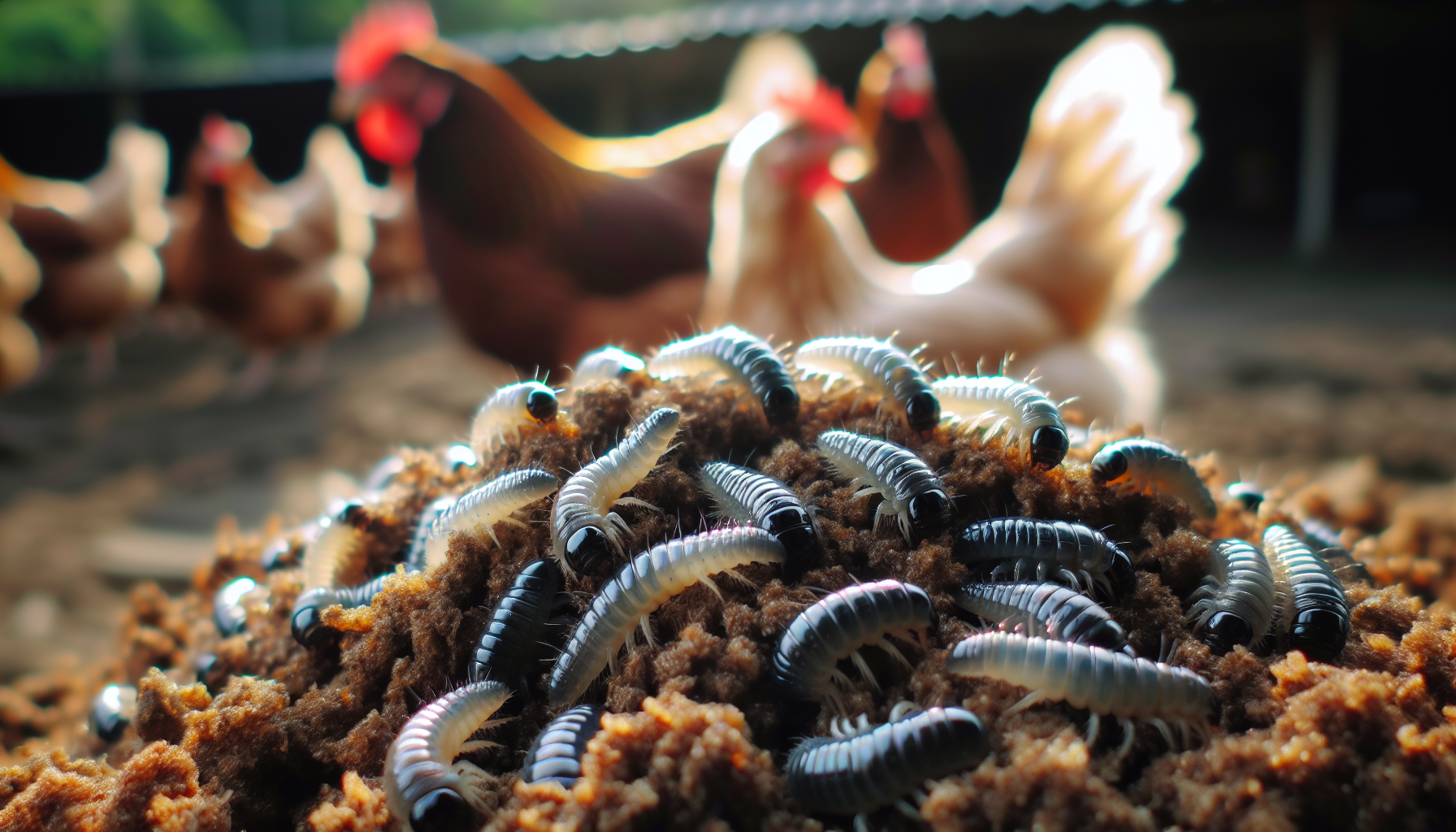
Not all maggots are alike. When it comes to safety and nutritional value, the type of maggot matters. The two species we’re focusing on are black soldier fly larvae and house fly maggots. The safety of these maggots as chicken feed varies based on their species and the environment from which they are sourced.
Black soldier fly larvae, for instance, are a safe and nutritious option for chickens. On the other hand, house fly maggots present some challenges that chicken owners need to be aware of. Let’s delve into these two types in more detail.
Black Soldier Fly Larvae
Black soldier fly larvae, also known as black fly larvae, are the superstars of the maggot world, offering a high protein content without carrying diseases, biting, or causing fly strikes. These larvae can be fed live, frozen then thawed, or dried, catering to different storage and nutritional needs.
What’s more, the larvae are auto-harvesting from composting bins, making collection convenient for chicken feed purposes. Adult black soldier flies, unlike many other fly species, focus solely on breeding and don’t pester humans or chickens. However, it’s crucial to source black soldier fly larvae from specialized suppliers to ensure their quality and safety.
House Fly Maggots
House fly maggots, on the other hand, can pose some challenges. Regular feeding of these maggots can lead to the transmission of diseases such as:
- Tapeworms
- Salmonella
- Campylobacter
- Clostridium botulinum
To minimize these risks, it is crucial to prevent creating environments that attract house flies, particularly moist, anaerobic conditions. Some tips to prevent attracting house flies include:
- Keeping the chicken coop clean and dry
- Removing any standing water or wet areas
- Properly disposing of chicken waste
- Using fly traps or screens to keep flies out of the coop
Additionally, feeding chickens dead flies is not advised due to the potential for disease transmission and because dead flies offer lower nutritional value compared to live maggots.
How to Provide Maggots to Your Chickens
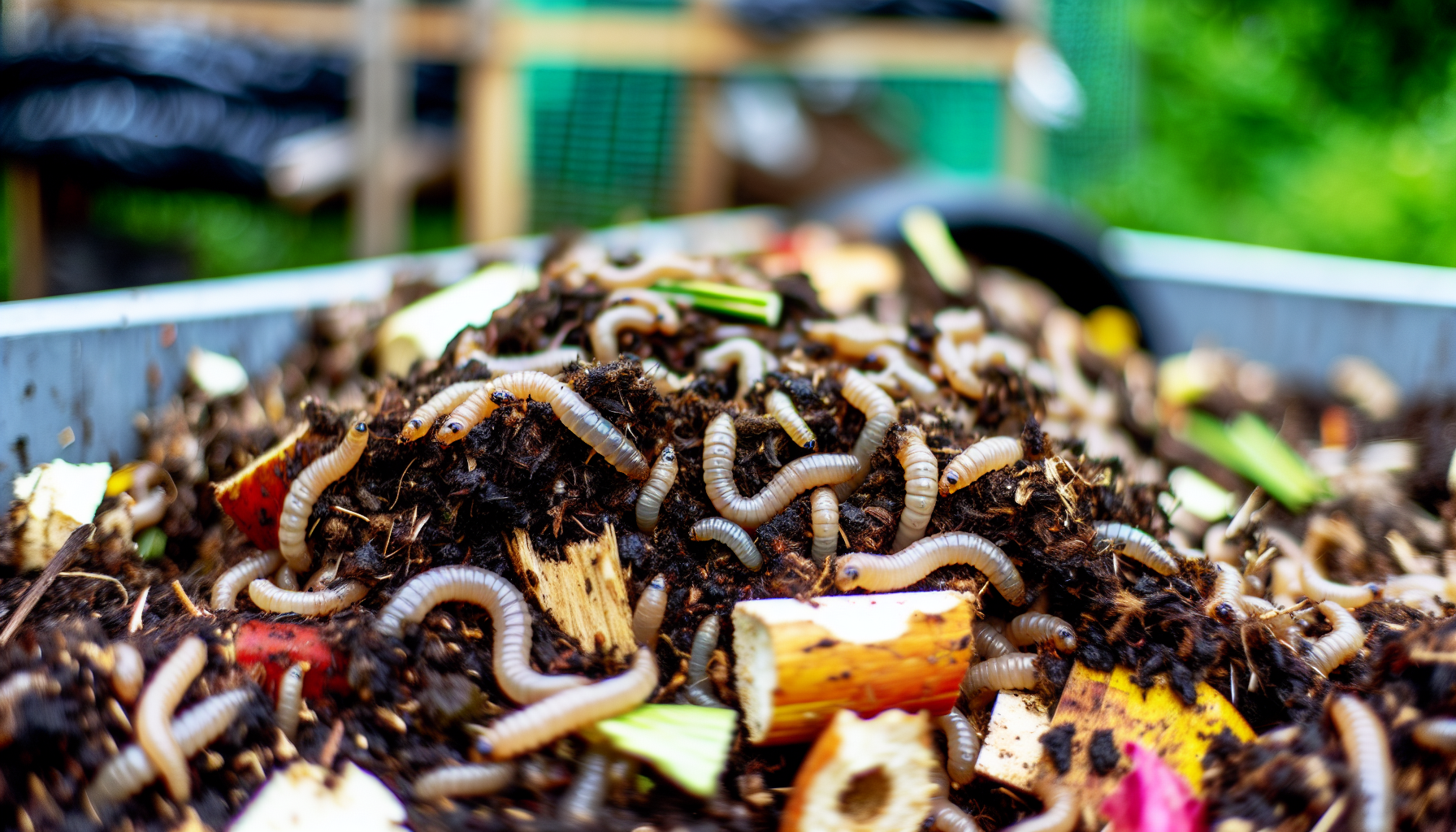
Having established the nutritional value and the types of maggots safe for chickens, it’s time to explore how to incorporate them into your chickens’ diet. It’s recommended to feed chickens soldier fly maggots due to their regular compost diet and reduced risk of disease transmission.
Feeding chickens live black soldier fly larvae provides mental stimulation and exercise, allowing them to engage in their instinctual foraging behaviors. You can introduce maggots into a chicken’s diet by placing a container full of larvae where chickens can reach them or by collecting them from an existing compost pile.
Growing Your Own Maggots
If you’re an adventurous chicken owner, you might consider growing your own maggots. To set up a system to grow maggots, use a bucket layered with old meat, carbon-rich materials like leaves, wood shavings, or straw to attract flies.
You can facilitate the movement of flies and maggots by drilling a row of small holes near the bottom of the bucket and larger holes near the top. Hanging the bucket in or near the chicken run enables chickens to easily access the maggots as they exit the container, serving as an efficient feeding system.
Purchasing Maggots from Reputable Sources
If creating a maggot farm isn’t up your alley, you can opt to purchase maggots from reputable sources. This ensures the health and safety of your chickens, as quality maggots for chicken feed should be guaranteed to be free from diseases and contaminants.
Companies such as Bugs for Birds and sources from Canada and the USA offer quality maggot products for chickens. Certain products even offer additional organic nutrients, like a 10-pound resealable bag of maggots combined with organic whole grains.
Preventing Maggot Infestations in the Chicken Coop
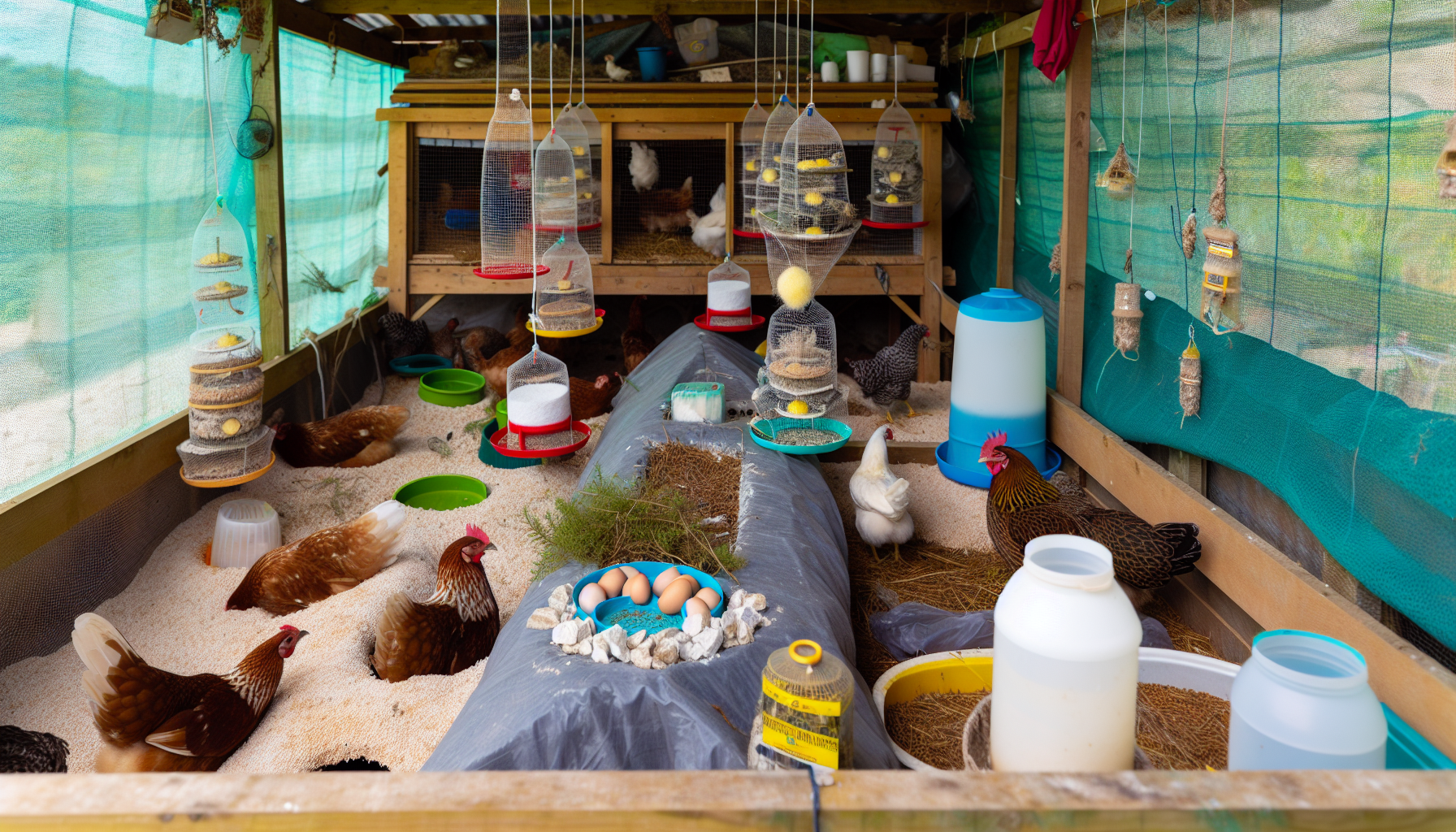
Despite maggots being a nutritious chicken feed, it is crucial to ward off maggot infestations in the chicken coop. Simple measures like not leaving food out overnight in the coop can significantly help in preventing fly attraction and subsequent maggot infestations.
Proper drainage in the coop is crucial to prevent water accumulation that could serve as breeding grounds for maggots, especially when chickens lay eggs. Here are some steps you can take to prevent maggot infestations:
- Move food and water out of the coop and into the run.
- Use dropping boards beneath roosts to catch droppings and prevent moisture buildup.
- Apply diatomaceous earth to the coop floor and bedding to control pests and absorb moisture.
Regular Cleaning and Maintenance
Keeping the chicken coop clean and well-maintained is paramount in preventing maggot infestations. Daily tasks like scraping droppings from the dropping boards should be part of your regular coop maintenance routine. Incorporating comprehensive weekly chores like dusting, vacuuming feathers, and refreshing the bedding can sustain a hygienic environment.
Intensive monthly deep cleaning tasks and yearly replacement of all bedding materials further contribute to maintaining a clean coop. Above all, keeping the coop clean and reducing fly populations is crucial to mitigate the risks of flystrike and botulism amongst the flock.
Using Fly Traps and Natural Repellents
Alongside regular cleaning, the use of fly traps and natural repellents can help in effectively controlling fly populations in and around the chicken coop. Simple methods like placing vanilla-scented air fresheners in the coop can deter flies as they are repelled by an ingredient in them.
Homemade repellent sprays, fly traps, fly strips, and even the introduction of fly predators near the coop can all contribute to lower fly numbers and prevent maggot infestations.
Potential Risks and Dangers of Feeding Maggots to Chickens
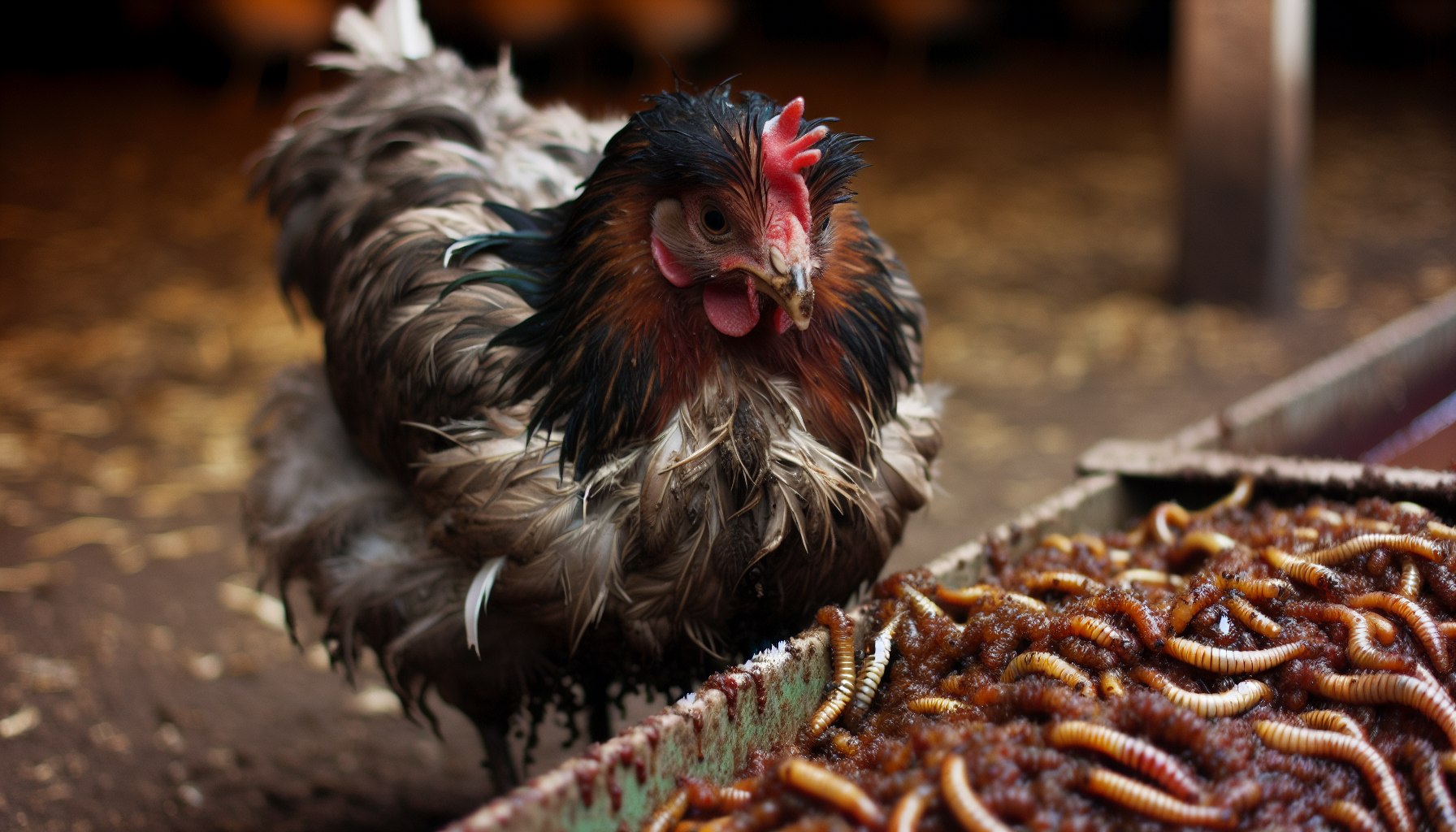
While maggots can provide a wealth of nutrients to chickens, they can also pose potential risks. Maggots may carry intestinal parasites like:
- roundworms
- cecal worms
- gapeworms
- capillaria worms
- tapeworms
These parasites can cause chickens and hens to become unthrifty and can lead to complications or even mortality.
Some common types of worms that can affect chickens are:
- Roundworms, which can cause blockages and reduced digestive function
- Cecal worms, which act as vectors for a serious infectious disease that affects turkeys and chickens
- Gapeworms, which lodge themselves in the trachea and can cause difficulty in breathing, leading to suffocation and death in severe infestations.
Chickens infested with Capillaria worms show symptoms including diarrhea, emaciation, and poor overall performance due to infection in various parts of the digestive tract. Tapeworms, which are segmented parasites, deplete nutrients from the chicken’s digested food and can cause significant weight loss and poor health.
Parasitic Infections
Parasitic infections like roundworms, capillaria worms, tapeworms, cecal worms, and gapeworms can all be transmitted by maggots to chickens. Roundworm and tapeworm infestations begin with eggs in the environment, which develop into larvae that can be picked up by maggots, while gapeworms and capillaria worms may have direct or indirect life cycles involving intermediate hosts such as earthworms.
Heavy parasite infestations can lead to severe health issues in chickens, including loss of feed efficiency, intestinal blockage, respiratory issues, and even asphyxiation.
Botulism in Poultry
Botulism in chicken farms is another serious risk that can be caused by ingesting botulinum neurotoxins from maggots.
Moreover, botulism outbreaks in poultry can be perpetuated through a carcass-maggot cycle, in which maggots consume these toxins from decaying matter and are then eaten by birds.
Signs of botulism in chickens include:
- Leg weakness
- Paresis
- Flaccid paralysis
- Inability to raise their neck or eyelids
These signs potentially indicate a need for diagnostic testing to confirm botulism. Treatment for botulism includes supportive care and possible use of antitoxins, while preventive measures such as avoiding roadkill for maggot production are essential to prevent transmission to chickens.
Chickens with severe botulism symptoms, such as inability to breathe due to muscle paralysis, are likely to succumb despite treatment.
Monitoring Your Chickens’ Health After Introducing Maggots
After introducing maggots into your chickens’ diet, it becomes imperative to keep a close watch on their health in the chicken area, as well as being mindful of other birds that may be present. Regular inspection for wounds and dirty vent areas can help prevent and detect flystrike early.
Keeping chickens’ vent areas clean and dry is crucial to avoid flystrike, especially if the chicken has chronic droppings problems. If your chickens exhibit abnormal droppings, a fecal float test by a veterinarian is recommended to identify the cause of digestive issues. Probiotics can be added to chickens’ water to help maintain digestive health and prevent conditions that could lead to flystrike.
If flystrike occurs, segregating affected chickens and treating wounds with appropriate solutions like Vetericyn Wound & Infection treatment can help manage the condition and avoid the need for antibiotics.
Signs of a Healthy Chicken
Upon consuming maggots, a healthy chicken will exhibit normal behaviors like foraging, preening, and mingling with the flock. Chickens maintaining personal hygiene through regular dust bathing can indicate good health.
Spending quality time with chickens and observing their behavior is important for early detection of health issues and ensuring they are healthy after consuming maggots. Healthy chickens will continue to have a good appetite and normal digestive functioning after eating maggots, without signs of gastrointestinal distress such as vomiting or diarrhea.
Chickens that happily live, are active and show interest in their surroundings, including seeking out and eating maggots, which are generally considered to be in good health.
Signs of Potential Issues
Potential health issues in chickens after eating maggots can manifest as various signs, from digestive issues to respiratory distress. Runny, watery, or loose droppings in chickens can be an indicator of digestive problems or illnesses that may be exacerbated by feeding maggots.
Unusual symptoms such as vomiting or diarrhea in chickens after eating maggots may require veterinary attention to rule out bacterial poisoning or myiasis. Accumulation of droppings beneath the vent can cause skin breakdown, increasing the risk of flystrike. The presence of wounds, especially around the vent area, can be vulnerable to flystrike and may need immediate attention to prevent further infection.
If a chicken exhibits lethargy, isolation from the flock, or a lack of appetite after eating maggots, it may indicate a health issue.
Frequently Asked Questions
How do you prepare maggots for chickens?
To prepare maggots for chickens, drill a hole at the top of the ramp and let the maggots instinctively climb out. Then, place a container in the chicken area for the chickens to eat the maggots.
Are house fly larvae good for chickens?
Yes, house fly larvae are good for chickens as they are highly nutritious and can help prevent feather loss and increase egg production, while also serving as a source of entertainment for the chickens. This can be a great addition to their diet.
Can I grow my own maggots for chicken feed?
Yes, you can easily grow maggots for chicken feed by setting up a simple system with a bucket layered with old meat and carbon-rich materials to attract flies.
So, Can Chickens Eat Maggots?
Maggots can provide a nutritious supplement for chickens, rich in protein, fat, and other essential nutrients. However, it’s crucial to ensure that the maggots are safe for consumption.
Remember, as chicken owners, our feathered friends rely on us for their health and well-being. Let’s make informed decisions about their diet and care for their best interest at heart.

